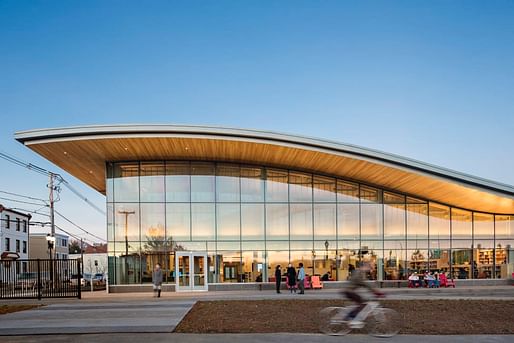anchor
The AIA urges lawmakers to reject rollbacks and issues seven infrastructure principles

Image Credits: Robert Benson Photography
The American Institute of Architects released a statement this morning, in light of damage wrought by Hurricanes Harvey and Irma, urging policy makers to reject any weakening of building codes. President Thomas Vonier advocated for state and federal legislators to reject attempts to roll back protections pointing out that "designing buildings to minimize damage from such natural disasters as hurricanes matters not only for public health, safety, and welfare; it also makes complete economic sense."
The AIA went on to remind that, like bridges and highways, America's buildings are infrastructure too, and as such, are crumbling. "Unless we include buildings in the discussion about our nation’s infrastructure renewal" the statement warned, "taxpayers will be stuck with decrepit community places, higher bills when repairs come due and structures vulnerable to disasters and threats."
Along with the above cautions, the AIA also released the following principles on infrastructure
- Infrastructure includes the public buildings that house our schools, courts, libraries, community centers and affordable housing. Any conversation about investing in the nation’s infrastructure must include the structures that connect Americans.
- Buildings must be a part of the infrastructure debate. Nearly all Americans (94%) agree that well-supported and maintained public buildings are important to their communities. Voters must expect policymakers to make the places where they meet, learn and conduct other business a part of any 21st century American infrastructure renewal.
- New infrastructure must be resilient to a changing climate. The world has changed. Sea levels are rising, disasters and threats are increasing. Public buildings that can mitigate the damage from extreme weather and other threats are not today’s regulatory burdens, but tomorrow’s assets.
- Building codes are the foundation of a resilient, safe infrastructure. We must fight efforts to weaken building codes in the quest for short-term profits. These efforts endanger life and property and jeopardize the built environment’s ability to withstand extreme weather events, devastating fires, and seismic and geologic events.
- We've build [sic] infrastructure before; we can do it again. Existing policies are already in place that can leverage billions of dollars in federal money to spur state and local infrastructure projects like schools, libraries and community centers. The Energy Efficient Commercial tax deduction alone has created millions of jobs and billions of dollars in GDP while helping local governments design buildings that save taxpayers and communities money.
- Good design yields big returns on infrastructure investment. Studies show that for every dollar spent on buildings to mitigate hazards, society saves $4 in return. Almost 40 percent of all US energy is consumed by buildings that produce carbon through heating, cooling and lighting and through their construction. Smart design that conserves energy not only reduces demand on our energy infrastructure, but lowers Americans’ tax bills.
- Infrastructure must secure and unite. Innovative design techniques for public structures like U.S. embassies, promenades and borders can secure our nation’s most important spaces while enabling a free and open society. Every day that America neglects its buildings is another day that future generations are burdened by our failure to plan and design.
Similar articles on Archinect that may interest you...

All 3 Comments
Wait, rollbacks on what? Foremost in my SoMe today is the rollback of the ADA proposed by HR620, the so-called ADA Education and Reform Act, which you can read about here.
Especially important, in light of!
7 reasons why you don't issue a blanket statement saying "we'll work with you..."
Block this user
Are you sure you want to block this user and hide all related comments throughout the site?
Archinect
This is your first comment on Archinect. Your comment will be visible once approved.